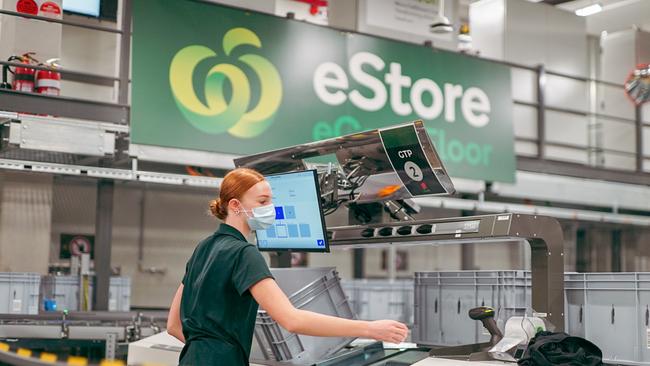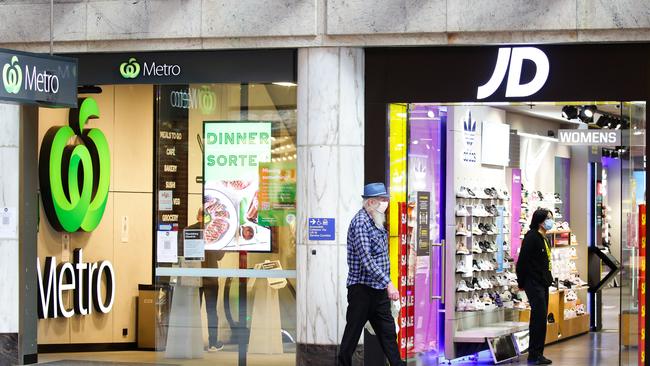Woolworths shoppers starting to trade down to cheaper foods as inflation bites, says Brad Banducci
Woolworths chief executive Brad Banducci says price rises and interest rate hikes are pushing consumers to buy cheaper foods – as retailers brace for belt-tightening into Christmas.
Business
Don't miss out on the headlines from Business. Followed categories will be added to My News.
Woolworths chief executive Brad Banducci says price rises and interest rate hikes are pushing consumers to buy cheaper foods – as retailers brace for belt-tightening into Christmas.
The supermarket boss said “all our customers are worried” about the rising cost of living, and while some shoppers were still sticking to their usual basket of groceries, others were making the switch to value offers.
Mr Banducci said the nation’s largest supermarket chain would focus on productivity as it attempted to cut the cost of shifting groceries from warehouses.
Early rumblings of shoppers reaching for cheaper private label products, opting for less expensive cuts of meat and filling their baskets with frozen and tinned food, have now become a noticeable trend in the $100bn supermarket sector, forcing grocery chains to focus on value and productivity.
On Thursday Mr Banducci said shoppers were starting to alter their shopping behaviour in response to interest rate rises and the elevated cost of living.

His comments mirrored those of Coles boss Steven Cain, who on Wednesday said he had also witnessed in his stores a shift to cheaper meat – away from beef and lamb to chicken and pork – with shoppers also picking up home-brand groceries and more frozen food and tinned food.
“Inflation is beginning to impact all aspects of our customers’ shop and we are seeing a gradual change in customer shopping behaviour,” Mr Banducci said on Thursday, after the retailer posted a 9.2 per cent gain in full-year revenue to $60.85bn as net profit leapt 282.5 per cent to $7.934bn.
The profit jump in 2022 was fuelled by the spin-off of its drinks and hotels arm Endeavour last year, and earnings were flat – up 0.7 per cent to $1.5bn – when excluding that demerger. The profit beat market expectations.
“While still very difficult to separate from the Covid-related impacts of the last two and a half years, we are seeing some customers trade down from beef into more affordable sources of protein and trade across from fresh vegetables into more affordable frozen and canned offerings,” Mr Banducci said.
He said this was for the moment limited to some cohorts of shoppers and certain locations around the country, but the early signs of this shift were evident.

Woolworths and Coles have both testified to the change in shopping behaviour, which looks to have gathered pace in June and July as the impact of interest rate rises since May finally hit.
Mr Banducci said he hoped inflation in Australia, and across the supermarket aisle, would peak by the end of the year.
This would drive a new productivity drive at Woolworths as Mr Banducci set his mind towards “item productivity”, which is the cost of handling pallets or cartons of groceries from their entry to distribution centres through to the stores and eventually into supermarket trolleys.
“Our business is driven by volumes … They are more important than ever now because we are coming into this post-Covid world,” he said on Thursday.
Barrenjoey analyst Tom Kierath said a focus on productivity and getting the costs of doing business down was the right strategy to adopt at this time.
“They haven’t really implemented any productivity initiatives in the last two years, started them and then Covid hit, so I think it was good to hear they aren’t starting new initiatives but rather they will just execute things they had planned to do over the last two years.
“I think as we come out of Covid we will see Woolworths execute on these strategies that will reduce costs and make the business more productive. They have invested a heck of a lot of money in the last five years into their supply chain and I don’t think we have seen the benefits of that yet, just because of Covid.”
Covid-19 costs of $323m were recorded in 2022, slightly down from $332m in 2021.
Meanwhile, sales at its Australian supermarkets increased 4.5 per cent to $45.461bn, with above-market growth in every quarter of the year. Growth of 9.7 per cent in the second half led to a small increase in EBIT of 0.3 per cent for the year, after a challenging first half. Supermarket earnings rose 0.3 per cent to $2.42bn.
A poor performance from its New Zealand supermarkets soured the results. Sales rose 6.6 per cent to $7.92bn but earnings fell 11.9 per cent to $296m, driven by pandemic disruptions, industrial unrest and major supply chain constraints.
At its Big W chain sales fell 3.3 per cent to $4.431bn, while earnings slumped 68.2 per cent to $55m. For online operations, sales increased 42.3 per cent or $1.4bn to $4.7bn, with e-commerce penetration reaching 10.3 per cent, up 276 basis points on the prior year.
Mr Banducci said sales in the first eight weeks of the new financial year were down 0.5 per cent on the prior year. Analysts were expecting sales growth of as much as 2 per cent.
The retailer has also slightly trimmed its reported final dividend to 53c per share, down from 55c in 2021.
Shares in Woolworths ended down $1.20 at $36.20.
More Coverage
Originally published as Woolworths shoppers starting to trade down to cheaper foods as inflation bites, says Brad Banducci





